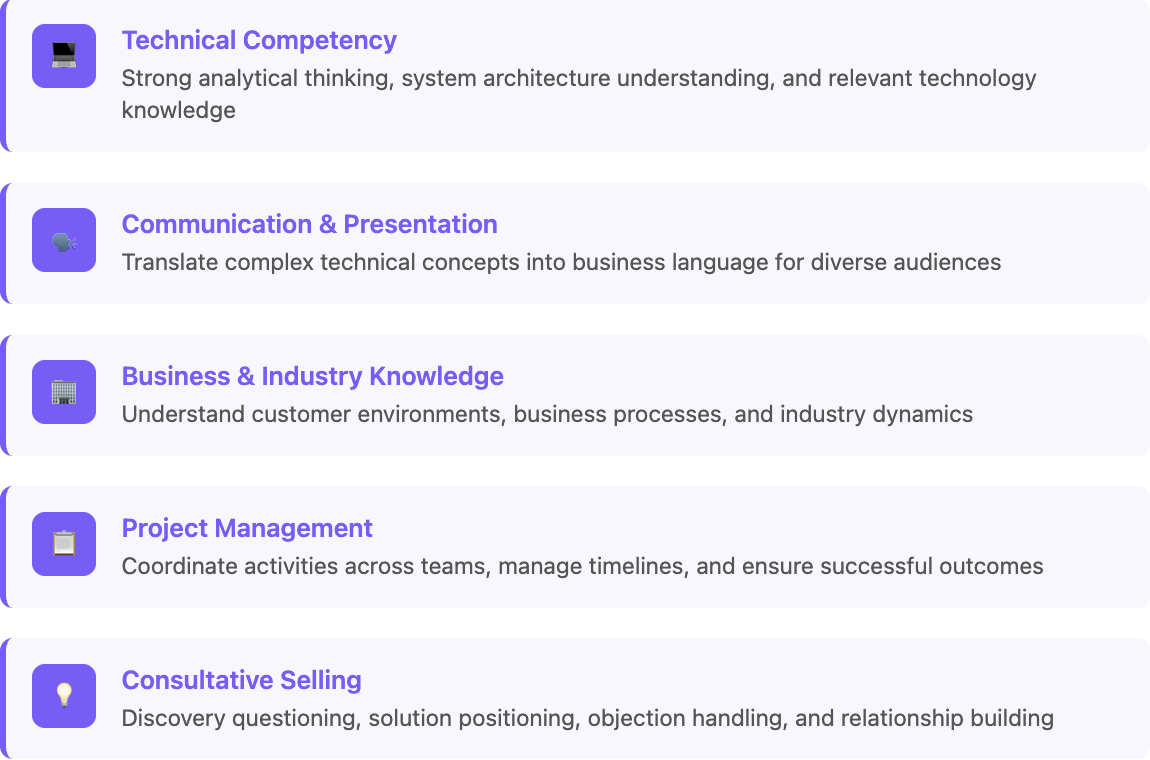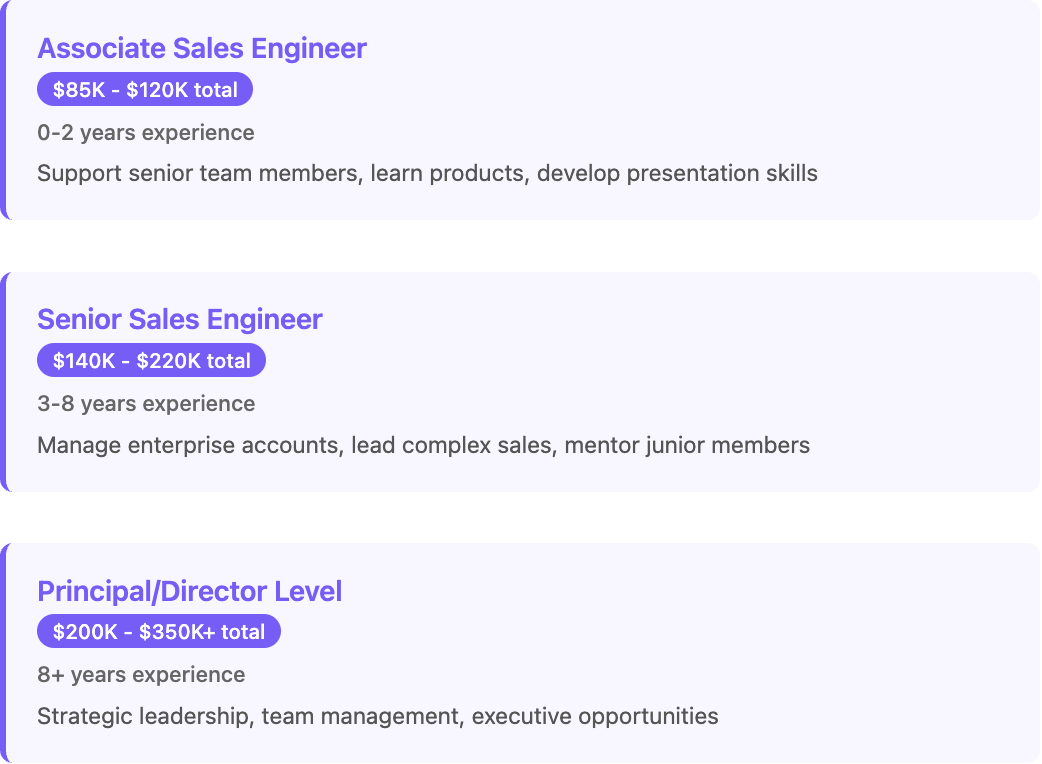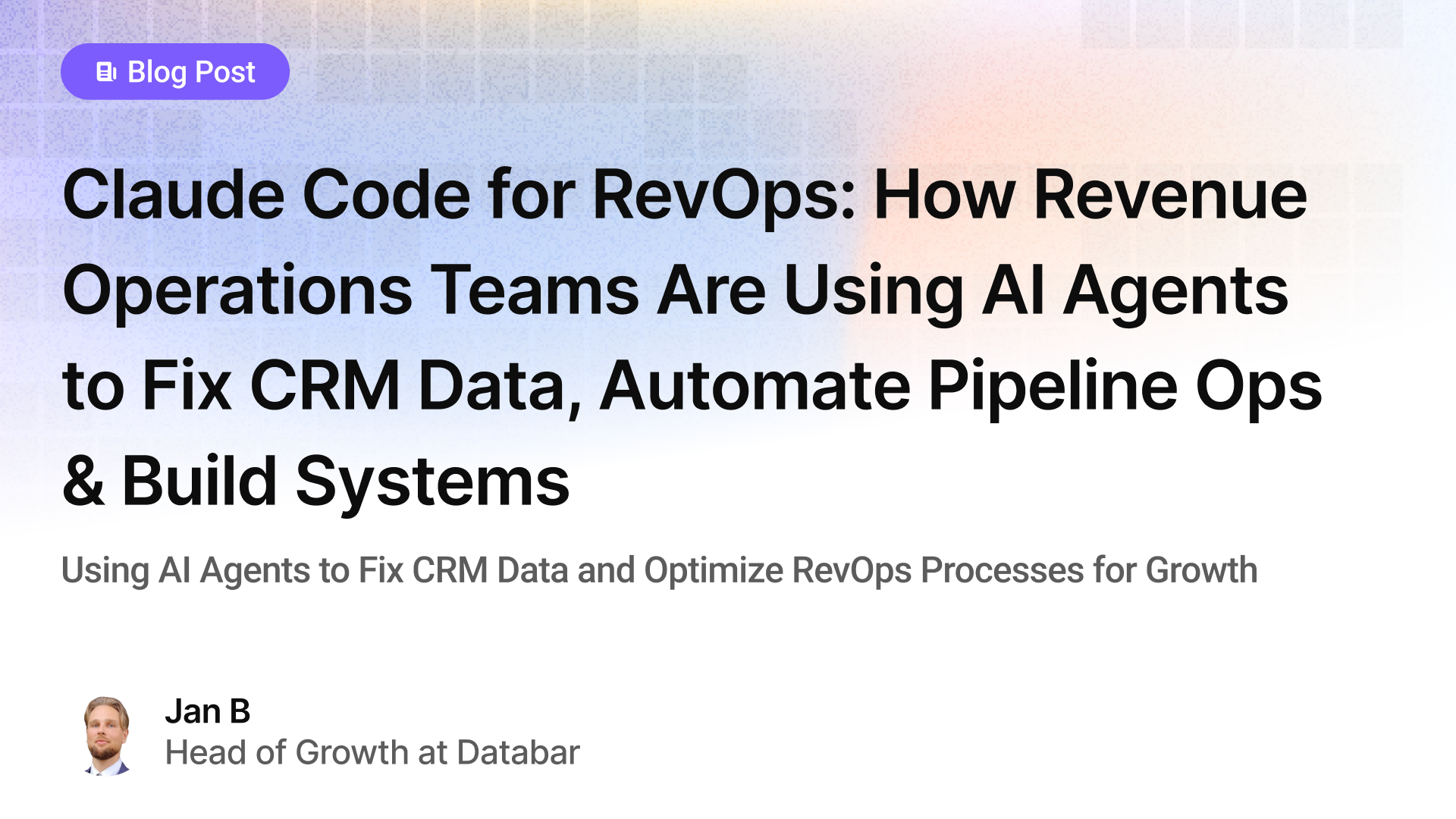Sales Engineering Jobs: The Complete Career Path Guide
A Detailed Guide to Careers, Skills, and Salaries in Sales Engineering
Blogby JanAugust 03, 2025

Sales engineering represents one of the fastest-growing and most rewarding career paths in today's technology-driven business landscape. With the U.S. Bureau of Labor Statistics projecting 6% growth through 2033—faster than average for all occupations—sales engineering offers exceptional opportunities for professionals who combine technical expertise with business acumen.
The median annual salary for sales engineers reached $121,520 in 2024, with top performers earning over $250,000 when including commissions and bonuses. This financial potential, combined with the intellectual challenge of solving complex technical problems while driving business growth, makes sales engineering an increasingly attractive career choice for both technical and business-minded professionals.

What is Sales Engineering?
Sales engineering is a specialized profession that bridges the gap between complex technical products and customer business needs. Sales engineers combine deep technical knowledge with consultative selling skills to help organizations understand, evaluate, and implement sophisticated technology solutions.
Unlike traditional sales roles that focus primarily on relationship building and closing deals, sales engineers serve as trusted technical advisors who can articulate how complex products solve specific business challenges. They translate technical capabilities into business value, conduct product demonstrations, design custom solutions, and support customers throughout the entire buying and implementation process.
Sales engineers typically work in business-to-business environments, selling products and services such as enterprise software solutions, industrial equipment, medical devices, telecommunications systems, cybersecurity platforms, cloud computing services, and scientific instruments. The complexity and high value of these solutions require technical expertise that goes beyond what traditional sales representatives can provide.
The Evolution of Sales Engineering
The sales engineering profession has evolved significantly over the past decade, driven by increasing technological complexity and changing buyer expectations. Modern sales engineers operate in environments where customers conduct extensive research before engaging with vendors, requiring deeper technical expertise and more consultative approaches.
Today's sales engineers must understand not only their own products but also complementary technologies, competitive landscapes, and industry-specific challenges. They work closely with multiple stakeholders including technical teams, procurement departments, executive leadership, and end users, requiring sophisticated communication and project management skills.
The role has also expanded beyond traditional pre-sales activities to include post-sales support, customer success initiatives, and product feedback collection. This evolution has created more diverse career opportunities and increased the strategic importance of sales engineering within technology organizations.

Core Sales Engineering Responsibilities
Sales engineers wear multiple hats and manage diverse responsibilities that span technical expertise, sales execution, and customer relationship management.
Technical Product Expertise forms the foundation of sales engineering success. Sales engineers must develop comprehensive understanding of their products' technical capabilities, architecture, integration points, and limitations. They stay current with product updates, participate in technical training programs, and often contribute to product development by providing customer feedback to engineering teams.
This technical knowledge enables sales engineers to answer complex questions during customer interactions, design customized solutions that meet specific requirements, and identify potential implementation challenges before they become problems. They must understand not only what their products do, but how they fit into broader technology ecosystems and business processes.
Customer Discovery and Needs Assessment requires sales engineers to act as consultative advisors who uncover business challenges and technical requirements. Through discovery meetings, technical workshops, and stakeholder interviews, they gather information about customer environments, pain points, success criteria, and decision-making processes.
Effective discovery enables sales engineers to position their solutions strategically, addressing specific customer needs rather than providing generic product demonstrations. This consultative approach builds trust and credibility while differentiating their company from competitors who take more transactional approaches.

Solution Design and Customization involves creating tailored proposals that address unique customer requirements. Sales engineers analyze technical specifications, design system architectures, estimate implementation timelines, and identify necessary resources and support services.
This process often requires collaboration with internal technical teams, product management, and professional services organizations to ensure proposed solutions are feasible and properly scoped. Sales engineers must balance customer desires with product capabilities and business constraints to create compelling yet realistic proposals.
Product Demonstrations and Presentations represent highly visible aspects of the sales engineering role. Sales engineers design and deliver compelling demonstrations that showcase how their products solve specific customer challenges. These presentations must be technically accurate while remaining accessible to diverse audiences including business executives, technical teams, and end users.
Successful demonstrations require careful preparation, including environment setup, scenario development, and stakeholder management. Sales engineers must adapt their presentations based on audience composition and feedback, often conducting multiple demonstrations for different stakeholder groups within the same organization.
Technical Sales Support encompasses ongoing assistance throughout extended sales cycles. Sales engineers answer technical questions, provide additional documentation, facilitate proof-of-concept projects, and coordinate trial implementations. They serve as primary technical contacts for customers, building relationships that often extend beyond individual transactions.
This support role requires strong project management skills as sales engineers coordinate activities across multiple internal and external teams. They must maintain momentum in complex sales processes while ensuring all technical requirements are properly addressed.
Competitive Analysis and Positioning involves understanding competitive landscapes and differentiating their solutions effectively. Sales engineers research competitor products, analyze customer requirements, and develop positioning strategies that highlight their advantages while addressing potential objections.
This competitive intelligence helps sales engineers handle objections confidently and guide customers toward decisions that favor their solutions. They must stay informed about industry trends, emerging technologies, and competitive developments that might impact their sales opportunities.
One significant challenge modern sales engineers face involves managing information from multiple sources while maintaining comprehensive customer profiles. Traditional approaches require manually tracking customer interactions across various systems, researching prospect companies individually, and consolidating technical requirements from different stakeholders.
Many sales engineers struggle with data fragmentation across CRM systems, technical documentation, competitive intelligence platforms, and customer communication tools. This complexity makes it difficult to maintain complete pictures of customer environments and requirements, potentially leading to missed opportunities or inadequate solution design.
Advanced sales engineers address these challenges through integrated data platforms that consolidate information from multiple sources. This coordination often requires close collaboration with Sales Operations teams who manage the technical infrastructure supporting complex sales processes. Solutions like Databar.ai enable access to comprehensive company and contact information from 90+ data providers, allowing sales engineers to quickly research prospects, understand organizational structures, and identify key stakeholders without managing multiple data subscriptions or conducting extensive manual research.
Essential Skills for Sales Engineering Success
Sales engineering requires a unique combination of technical expertise, business acumen, and interpersonal skills that enable professionals to excel in complex technical sales environments.

Technical Competency serves as the foundation for sales engineering credibility. While specific technical requirements vary by industry and product category, successful sales engineers typically possess strong analytical thinking abilities, understanding of system architectures and integration patterns, familiarity with software development concepts and methodologies, knowledge of networking, security, and infrastructure principles, and experience with data analysis and reporting tools.
The depth of technical knowledge required depends on the complexity of products being sold. Software sales engineers may need programming experience and system administration skills, while industrial equipment sales engineers might require mechanical or electrical engineering backgrounds. Regardless of specialization, all sales engineers must understand how their products fit into broader technology ecosystems.
Communication and Presentation Skills enable sales engineers to translate complex technical concepts into business language that resonates with diverse audiences. This includes verbal communication skills for meetings, presentations, and demonstrations, written communication for proposals, documentation, and follow-up correspondence, presentation design and delivery capabilities, and active listening skills for understanding customer needs and concerns.
Effective communication requires adapting messages based on audience composition and technical sophistication. Sales engineers must explain the same concepts differently when speaking with technical implementers versus business executives, maintaining accuracy while ensuring relevance and comprehension.
Business and Industry Knowledge helps sales engineers understand customer environments and position solutions strategically. This encompasses understanding of business processes and operational challenges, knowledge of industry trends, regulations, and competitive dynamics, financial acumen for discussing ROI, budgets, and business cases, and awareness of organizational structures and decision-making processes.
Sales engineers who understand their customers' businesses can provide more valuable insights and recommendations, positioning themselves as trusted advisors rather than product vendors. This business knowledge differentiates exceptional sales engineers from those who focus solely on technical capabilities.
Project Management and Organization skills become critical as sales engineers manage multiple complex opportunities simultaneously. This includes ability to coordinate activities across multiple internal and external teams, timeline management and milestone tracking, resource planning and allocation, and risk assessment and mitigation strategies.
Sales engineers often serve as project managers for complex sales processes, ensuring all activities progress smoothly while maintaining customer satisfaction and internal alignment. Strong organizational skills prevent important details from falling through cracks in complex deals.
Consultative Selling Abilities enable sales engineers to uncover customer needs and guide them toward appropriate solutions. Key capabilities include needs assessment and discovery questioning techniques, solution positioning and value articulation, objection handling and competitive differentiation, and relationship building and stakeholder management.
These selling skills distinguish sales engineers from technical support representatives or product specialists. While technical knowledge provides credibility, selling skills drive revenue results and career advancement.
Sales Engineering Career Path and Progression
Sales engineering offers diverse career progression opportunities that can lead to executive positions, specialized expertise roles, or entrepreneurial ventures.

Entry-Level Positions typically include titles such as Associate Sales Engineer, Junior Solutions Consultant, Technical Sales Representative, or Sales Engineering Trainee. These roles focus on supporting senior team members, learning product knowledge, developing presentation skills, and gaining customer interaction experience.
Entry-level sales engineers often handle smaller accounts, assist with product demonstrations, create technical documentation, and participate in trade shows and marketing events. Success in these positions requires strong learning agility, technical aptitude, and communication skills.
Compensation for entry-level positions ranges from $68,000 to $85,000 in base salary, with total compensation reaching $85,000 to $120,000 including commissions and bonuses. While compensation starts modestly, the learning opportunities and career advancement potential make these positions attractive for recent graduates and career changers.
Mid-Level Positions include Senior Sales Engineer, Solutions Consultant, Technical Account Manager, and Regional Sales Engineer roles. These positions involve managing larger accounts, leading complex sales processes, mentoring junior team members, and contributing to strategic initiatives.
Mid-level sales engineers typically handle enterprise accounts, conduct advanced product demonstrations, participate in customer advisory boards, and collaborate closely with product management teams. They may specialize in specific industries, product lines, or geographic regions.
Compensation for mid-level positions ranges from $100,000 to $150,000 in base salary, with total compensation reaching $140,000 to $220,000. At this level, commission potential increases significantly, and top performers can earn substantially more than base compensation.
Senior-Level Positions encompass roles such as Principal Sales Engineer, Director of Sales Engineering, VP of Solutions, and Chief Revenue Officer. These executive positions involve strategic leadership, team management, process development, and organizational growth initiatives.
Senior sales engineers may transition into management roles overseeing sales engineering teams, move into product management or marketing positions, or pursue executive opportunities in customer success or business development. Some become independent consultants or start their own companies. Executive advancement opportunities include progression to Chief Sales Officer roles where technical expertise provides valuable leadership credibility.
Compensation for senior positions ranges from $150,000 to $250,000+ in base salary, with total compensation often exceeding $300,000 when including equity, bonuses, and commissions. These roles offer significant financial rewards along with substantial business impact and leadership responsibilities.
Alternative Career Paths
Sales engineering skills transfer well to various related roles, providing flexibility for career transitions. Product Management appeals to sales engineers who want to influence product development and strategy. Their customer-facing experience provides valuable insights into market needs and competitive positioning.
Customer Success Management attracts sales engineers interested in post-sales relationships and customer growth. Their technical expertise helps customers achieve value from implementations while identifying expansion opportunities.
Marketing and Business Development roles leverage sales engineers' market knowledge and communication skills. They may transition into product marketing, competitive intelligence, or partnership development positions.
Entrepreneurship and Consulting opportunities appeal to experienced sales engineers who want to leverage their expertise independently. Many successful technology consultants and company founders began their careers in sales engineering.
Sales Engineering Compensation and Benefits
Sales engineering offers attractive compensation packages that typically combine base salaries with performance-based incentives, creating significant earning potential for high performers.

Base Salary Components provide financial stability while performance incentives reward results. Entry-level positions typically feature base salaries comprising 70-80% of total compensation, with the remainder coming from commissions and bonuses. As career levels advance, variable compensation percentages increase, with senior positions often featuring 50-60% base salary and 40-50% variable compensation.
Commission and Bonus Structures vary significantly across companies and industries. Software companies often provide quarterly commissions based on bookings or revenue generated, while industrial equipment manufacturers may offer annual bonuses tied to territory performance. Some organizations use team-based incentives that reward collective results, while others focus on individual achievement.
High-performing sales engineers can earn substantial commissions that double or triple their base compensation. Top performers in enterprise software sales, for example, commonly earn $300,000 to $500,000 annually when combining base salary, commissions, and bonuses.
Equity and Long-Term Incentives are increasingly common, particularly in technology companies and startups. Stock options, restricted stock units, and employee stock purchase plans provide additional compensation potential tied to company performance. These long-term incentives can represent significant value for employees at successful companies.
Geographic and Industry Variations create substantial differences in compensation levels. Technology hubs such as San Francisco, Seattle, and New York command 25-40% premiums over national averages, while industries such as software, telecommunications, and medical devices typically offer higher compensation than manufacturing or industrial sectors.
Remote work opportunities have somewhat equalized geographic compensation differences, as companies compete for talent regardless of location. However, cost-of-living considerations still influence compensation decisions for many organizations.
Benefits and Perks often include comprehensive health insurance, flexible work arrangements, professional development budgets, conference attendance opportunities, company vehicle or travel allowances, and performance recognition programs.
Technology companies frequently offer additional perks such as flexible time off, remote work options, professional development budgets, and comprehensive wellness programs that enhance total compensation value beyond direct financial compensation.
Modern Sales Engineering Challenges and Solutions
Today's sales engineers face unprecedented challenges that require sophisticated approaches and technological solutions to maintain effectiveness and drive results.
Information Management and Research Complexity represents a significant challenge as sales engineers must gather and analyze information from numerous sources while maintaining comprehensive customer profiles. Traditional approaches involve manually researching prospect companies, tracking competitive intelligence, managing technical documentation, and coordinating information across multiple systems.
This complexity creates inefficiencies that reduce time available for high-value activities such as customer interaction and solution development. Many sales engineers struggle with fragmented information systems that make it difficult to maintain complete pictures of customer environments and requirements.
Longer Sales Cycles and Complex Decision-Making require sales engineers to maintain engagement with multiple stakeholders over extended periods. Enterprise technology purchases often involve 6-18 month sales cycles with numerous technical evaluations, procurement reviews, and stakeholder approvals.
Managing these complex processes requires sophisticated project management skills and systematic approaches to stakeholder communication. Sales engineers must coordinate activities across multiple internal and external teams while maintaining momentum toward purchasing decisions.
Increasing Buyer Sophistication and Self-Service Expectations challenge sales engineers to provide unique value beyond basic product information. Modern buyers conduct extensive research before engaging with vendors, often arriving at initial meetings with detailed technical questions and specific requirements.
This trend requires sales engineers to elevate their expertise and consultation capabilities, focusing on insights and recommendations rather than basic product education. They must understand customer environments deeply enough to provide strategic guidance that justifies their involvement in purchasing processes.
Technology Integration and Data Management challenges stem from the proliferation of sales and marketing tools that create information silos and workflow inefficiencies. Sales engineers often work with separate systems for CRM, technical documentation, competitive intelligence, and customer communication, making it difficult to maintain comprehensive views of opportunities and relationships.
Modern sales engineers address these challenges through integrated approaches that consolidate information and automate routine tasks. Platforms like Databar.ai exemplify this trend by providing access to comprehensive company and contact data from 90+ sources through single interfaces, eliminating the need to manage multiple data subscriptions while ensuring comprehensive prospect research capabilities.
Skills Development and Continuous Learning requirements continue expanding as technology evolves rapidly and customer expectations increase. Sales engineers must stay current with product updates, industry trends, competitive developments, and new selling methodologies while managing demanding travel and customer interaction schedules.
Successful sales engineers develop systematic approaches to continuous learning, including dedicated time for product training, industry research, and skill development. Many organizations support these efforts through professional development budgets, conference attendance, and internal training programs.
How to Break Into Sales Engineering
Sales engineering attracts professionals from diverse backgrounds, offering multiple pathways for career entry and advancement.
Educational Requirements typically include bachelor's degrees in engineering, computer science, or related technical fields. However, the specific educational background matters less than demonstrated technical aptitude and communication skills. Many successful sales engineers have degrees in business, marketing, or other fields, particularly when combined with relevant technical experience or certifications.
Advanced degrees such as MBAs or technical masters degrees can provide advantages for certain positions, especially in competitive markets or complex product categories. However, practical experience and demonstrated results often carry more weight than formal educational credentials.
Alternative Entry Paths include transitioning from technical roles such as engineering, system administration, or software development into customer-facing positions. These transitions leverage existing technical expertise while developing sales and communication skills through training and mentoring programs.
Business professionals with sales, marketing, or consulting backgrounds can also transition into sales engineering by developing technical knowledge through certification programs, hands-on training, and industry experience. This path often appeals to individuals who want to combine business skills with technical expertise. Many sales engineers also benefit from understanding the SDR career path to better collaborate with sales development teams.
Skill Development Strategies for aspiring sales engineers include pursuing relevant technical certifications, participating in industry conferences and training programs, developing presentation and communication skills, gaining hands-on experience with relevant technologies, and building networks within target industries.
Many successful sales engineers begin by specializing in specific technology areas or industry verticals, developing deep expertise that differentiates them from generalist candidates. This specialization can provide competitive advantages in both job searches and career advancement.
Job Search Approaches should focus on demonstrating both technical competency and communication skills through portfolio development, technical writing samples, presentation recordings, and professional references that attest to both technical and interpersonal abilities.
Networking within industry communities, participating in technical forums, and engaging with sales engineering professionals through platforms like LinkedIn can provide valuable insights and potential opportunities. Many sales engineering positions are filled through professional networks rather than traditional job postings.
Industry Specializations and Opportunities
Sales engineering opportunities exist across numerous industries, each offering unique challenges, requirements, and career trajectories.
Software and Technology represents the largest and fastest-growing sector for sales engineering careers. Enterprise software, cybersecurity, cloud computing, artificial intelligence, and data analytics companies actively recruit sales engineers to support complex product sales and implementation processes.
Technology sales engineers often work with sophisticated technical buyers who require deep product knowledge and strategic insights. Career advancement opportunities include specialized roles in emerging technologies, management positions, and transitions into product management or executive roles.
Industrial and Manufacturing sectors offer sales engineering opportunities in areas such as automation systems, manufacturing equipment, process control systems, and industrial software. These positions often require engineering degrees and deep understanding of manufacturing processes and operational challenges.
Industrial sales engineers frequently work on large capital equipment sales with long implementation timelines and complex technical requirements. Success in these roles often leads to management positions or opportunities with equipment manufacturers and system integrators.
Healthcare and Life Sciences industries provide sales engineering roles in medical devices, laboratory equipment, healthcare information systems, and pharmaceutical manufacturing. These positions require understanding of regulatory requirements, clinical workflows, and scientific principles.
Healthcare sales engineers often work closely with medical professionals and researchers, requiring strong scientific communication skills and ethical considerations around patient care and regulatory compliance.
Financial Services and Fintech companies seek sales engineers for trading systems, risk management platforms, payment processing solutions, and regulatory compliance tools. These roles require understanding of financial markets, regulatory requirements, and risk management principles.
Financial services sales engineers often work with sophisticated technical and business stakeholders who require precise understanding of financial concepts and regulatory implications.
Future of Sales Engineering
The sales engineering profession continues evolving as technology advancement and changing buyer behaviors create new opportunities and challenges.
Artificial Intelligence and Automation Integration will increasingly augment sales engineering capabilities rather than replace human expertise. AI tools will handle routine research tasks, generate initial solution proposals, and provide real-time competitive intelligence, freeing sales engineers to focus on strategic consultation and relationship building.
Sales engineers who embrace these technologies and learn to leverage AI capabilities will gain significant competitive advantages over those who resist technological advancement. The key will be understanding how to combine AI efficiency with human insight and relationship skills.
Remote and Hybrid Work Models will continue expanding, creating opportunities for sales engineers to work with customers and prospects globally without extensive travel requirements. Virtual demonstration platforms, collaborative design tools, and remote implementation capabilities will enable more efficient sales processes while reducing costs and travel requirements.
This shift will require new skills in virtual presentation, remote relationship building, and digital collaboration tools. Sales engineers who master these capabilities will access broader opportunity sets and potentially better work-life balance.
Increased Specialization and Expertise Requirements will drive sales engineers toward deeper knowledge in specific technology areas or industry verticals. As products become more sophisticated and integrated, customers will expect sales engineers to provide strategic insights that go beyond basic product knowledge.
This trend will create opportunities for sales engineers who develop recognized expertise in emerging technology areas such as artificial intelligence, cybersecurity, cloud computing, or industry-specific applications. For technically-minded professionals, exploring the GTM Engineer transition can provide additional career advancement opportunities combining sales and technical expertise.
Expanded Post-Sales Responsibilities will blur traditional boundaries between sales engineering and customer success roles. Sales engineers will increasingly support customers through implementation and optimization phases, creating opportunities for deeper relationships and expanded revenue generation.
This evolution will require sales engineers to develop project management, change management, and customer success skills beyond traditional pre-sales capabilities.
Conclusion
Sales engineering represents an exceptional career opportunity for professionals who combine technical expertise with business acumen and communication skills. With strong job growth projections, attractive compensation packages, and diverse advancement opportunities, sales engineering offers pathways to both financial success and professional fulfillment.
The profession's evolution toward more consultative and strategic roles increases its importance within technology organizations while creating opportunities for meaningful impact on customer success and business growth. Sales engineers who embrace continuous learning, develop broad skill sets, and adapt to changing market conditions will find abundant opportunities for career advancement and personal satisfaction.
For individuals considering sales engineering careers, the combination of technical challenge, business impact, and financial rewards makes this profession particularly attractive in today's technology-driven economy. Organizations that invest in sales engineering talent and capabilities position themselves for accelerated growth and competitive advantage in increasingly complex markets.
The future belongs to sales engineers who can navigate technological complexity while building authentic customer relationships and delivering measurable business value. Those who develop these capabilities will find themselves at the center of innovation and growth in organizations across numerous industries.
Frequently Asked Questions (FAQ)
What does a sales engineer do? Sales engineers combine technical expertise with sales skills to sell complex products and services. They conduct product demonstrations, design custom solutions, support customers through purchasing processes, and serve as technical advisors to help customers understand how products solve their business challenges.
How much do sales engineers make? Sales engineers earn median salaries of $121,520 according to the Bureau of Labor Statistics, with total compensation ranging from $85,000 for entry-level positions to over $350,000 for senior roles when including commissions and bonuses. Top performers often earn significantly more through performance-based incentives.
What skills do you need to be a sales engineer? Essential skills include technical knowledge relevant to products being sold, strong communication and presentation abilities, consultative selling skills, project management capabilities, and business acumen. Specific technical requirements vary by industry and product complexity.
Do you need an engineering degree to be a sales engineer? While engineering degrees are common, they're not always required. Many successful sales engineers have degrees in business, computer science, or other fields. Relevant technical experience, certifications, and demonstrated aptitude can substitute for formal engineering education.
Is sales engineering a good career? Yes, sales engineering offers excellent career prospects with strong job growth (6% through 2033), attractive compensation, diverse advancement opportunities, and the intellectual challenge of solving complex technical problems while driving business results.
What industries hire sales engineers? Major industries include software and technology, industrial manufacturing, healthcare and medical devices, telecommunications, financial services, aerospace and defense, and scientific instruments. Virtually any industry with complex technical products employs sales engineers.
How do you get started in sales engineering? Start by developing technical knowledge through education or experience, then gain customer-facing skills through entry-level positions, internships, or transitioning from technical roles. Building networks within target industries and obtaining relevant certifications can also help.
What's the difference between sales engineers and account executives? Sales engineers focus on technical aspects of sales processes, conducting demonstrations and designing solutions, while account executives manage relationships, negotiate contracts, and drive overall sales strategy. Many sales engineers work alongside account executives in team-selling approaches.
Related articles

Claude Code for RevOps: How Revenue Operations Teams Are Using AI Agents to Fix CRM Data, Automate Pipeline Ops & Build Systems
Using AI Agents to Fix CRM Data and Streamline Revenue Operations for Scalable Growth
by Jan, February 24, 2026

Claude Code for Sales Managers: A Practical Guide to Deal Reviews, Rep Coaching, Pipeline Inspection, and Forecast Prep in 2026
Speed Up Coaching and Forecast Prep with Data You Can Trust
by Jan, February 23, 2026

How to Build a Client Onboarding System in Claude Code for GTM Agencies
How To Cut Client Onboarding from Weeks to Hours with Claude Code
by Jan, February 22, 2026

How to Run Closed-Won Analysis with Claude Code
How Claude Code Turns Your CRM Data into Actionable Sales Strategies
by Jan, February 21, 2026
